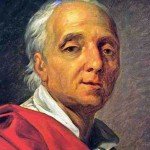 Denis Diderot (1713-1784) was a writer and philosopher whose corpus of work contributed to the ideas of the French Revolution. Born in Champagne, northern France, Diderot received a typical religious education before relocating to Paris to study philosophy. Shunning careers in the law and the clergy, Diderot decided instead to become an author. He spent a decade writing prolifically, though it brought him neither fame nor financial reward. Philosophically, Diderot’s work was clearly shaped by the Enlightenment: he advanced theories about logic, education and human society, often criticising organised religion and the traditions of the Ancien Régime. This occasionally got him into trouble, as in 1749 when Diderot was imprisoned for almost a year. On his release he began writing and assembling his best-known work, Encyclopédie: as the name suggests, a vast compilation of articles and essays, designed (according to Diderot) to “change the way people think”. It took him more than two decades to complete this enormous 27-volume work, the first copies of which appeared in the early 1770s. Though it was loathed by the church and suppressed by the government, the Encyclopédie became the handbook to the French Enlightenment; it was widely read and discussed in the salons and political clubs. Diderot himself spent the last ten years of his life doing more study than writing, eventually succumbing to emphysema in 1784.
Denis Diderot (1713-1784) was a writer and philosopher whose corpus of work contributed to the ideas of the French Revolution. Born in Champagne, northern France, Diderot received a typical religious education before relocating to Paris to study philosophy. Shunning careers in the law and the clergy, Diderot decided instead to become an author. He spent a decade writing prolifically, though it brought him neither fame nor financial reward. Philosophically, Diderot’s work was clearly shaped by the Enlightenment: he advanced theories about logic, education and human society, often criticising organised religion and the traditions of the Ancien Régime. This occasionally got him into trouble, as in 1749 when Diderot was imprisoned for almost a year. On his release he began writing and assembling his best-known work, Encyclopédie: as the name suggests, a vast compilation of articles and essays, designed (according to Diderot) to “change the way people think”. It took him more than two decades to complete this enormous 27-volume work, the first copies of which appeared in the early 1770s. Though it was loathed by the church and suppressed by the government, the Encyclopédie became the handbook to the French Enlightenment; it was widely read and discussed in the salons and political clubs. Diderot himself spent the last ten years of his life doing more study than writing, eventually succumbing to emphysema in 1784.
Information and resources on this page are © Alpha History 2018. Content on this page may not be copied, republished or redistributed without the express permission of Alpha History. For more information please refer to our Terms of Use.
